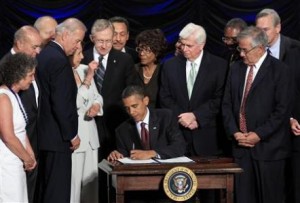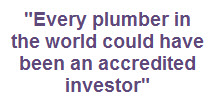Washington calls it the Dodd-Frank Wall Street Reform and Consumer Protection Act of 2010. If you’re starting a hedge fund or if you’re in the business of hedge fund marketing, you can call it largely irrelevant.
The 2,319-pager shoots buckshot at the financial industry and, of its 16 titles, only one has a bead on hedge fund marketing or operations.
Registration in that Legislation?

Source: Reuters
Title IV is headlined, “Regulation of Advisers to Hedge Funds and Others” and it begins by providing a so-called “short title”.
“This title may be cited as the ‘Private Fund Investment Advisers Registration Act of 2010’,” the law states. In other words, you have Senator Dodd’s and Congressman Frank’s permission to shorten the title’s name from an eight-word string to an entirely different eight-word string.
And that may be the clearest thing it says for the next 27 pages. The short name begs the question from anyone even thinking of starting a hedge fund, “Do I have to register?” The answer is about as clear as Chris Dodd’s mortgage terms.
“In general, if you have between 25 million and 100 million dollars [in assets under management], then you’re going to have to register in your state, unless your state does not have an exam requirement,” parses Judy Gross, a securities lawyer and principal of New York-based JG Advisory Services.
“If you are required to register in more than 15 states, then you may register with the SEC instead of the states if you are in that dollar range for AUM. If you have over 100 million dollars AUM, then you’re going to register with the SEC unless you are below 150 million and you only advise private funds.”
She further cautions that the states play a complicated but critical part in the registration landscape. “There are some big exemptions in certain states,” she says. “Every single state has a different law. You should check your own.”
Some of the states, Gross notes, may require a licensing examination as part of the registration process, although the federal government does not.
Still, registration at the federal level is still a moving target. The law doesn’t go into effect until July 21, 2011, so the SEC recognizes the need to have the gray areas cleared up by then.
“We’re in the beginning of the process of writing rules,” an SEC spokesman said.
These rules-in-progress aren’t all about registration. The law also affects record keeping, reporting requirements, short-selling and the treatment of foreign-domiciled investment advisors. Until the commission’s staff has written the rules, invited public comment and promulgated final versions, hedge fund managers will have little to go on to determine their compliance requirements. But all these stipulations appear to be taking a back seat to the registration requirements, which are likely to be dealt with first. Not that these aren’t things to be concerned about, but it’s way too soon to panic about the loss of hedge fund jobs just yet.
Another proviso of Title IV ties hedge funds to the law’s overarching mandate to limit systemic risk, something that the federal government has never attempted to do before. It brings hedge funds under the purview of the Financial Stability Oversight Council, which other provisions of the law created to regulate non-bank actors like the ones who brought you the 2008-2009 meltdown.
The council could, in the interest of preventing a repeat, call upon financial services firms on a case-by-case basis to increase the frequency and detail of their reporting or to firm up its capital reserves. But let’s remember why the council was dreamed up in the first place: AIG, Bernie Madoff, and other captains of infamy. We’re talking about people who could take tens of billions of dollars out of the U.S. economy through sheer carelessness. Whether you’re just now starting a hedge fund or whether you’ve been in the industry long enough to have owned a cell phone that was the size your computer is now, you’re probably too small to fry.
Aside from Title IV, there’s only one other section of Dodd-Frank that has anything to do with hedge funds. One section of Title VI, “Improvements to Regulation of Bank and Savings Association Holding Companies and Deposit Institutions,” prohibits banks from owning hedge funds. The real purpose of this section is to get the banks from doing the kind of proprietary trades that smack of conflict of interest. The ownership-of-hedge-funds prohibition is there mainly to ensure that the banks don’t have a back door into that business. But since very few people who ever dreamed of starting a hedge fund wanted to do it as an employee of a bank, this isn’t too hard to swallow either.
Dodd-Frank and Hedge Fund Marketing
The only potential impact the new law might have on hedge fund marketing is around what constitutes an accredited investor. Essentially, you used to be able to count the value of your house to claim to be a millionaire and thus an accredited investor.
“The accredited investor definition went from including the house in net worth to excluding the house in net worth,” says Evan Rapoport, CEO of HedgeCo Securities, a West Palm Beach-based broker-dealer that markets hedge funds. The law “didn’t have much of an effect on how third-party marketers work. Almost all the clients we deal with are well above that net worth threshold.”
According to Rapoport, the real estate crash did more to take these borderline cases off hedge fund marketing professionals’ radars than Dodd-Frank is likely to. In 2007, it was hard to find a homeowner in the northeastern United States or California who couldn’t qualify.
“Every plumber in the world could have been an accredited investor,” Rapoport reminisced.
As for the truly wealthy investors, their memories tend to be quite long-term. They don’t need an act of Congress to tell them how to avoid making the same mistake twice. If you’re starting a hedge fund, you would have been well-advised to get registered under some other aegis even if Dodd-Frank hadn’t passed.
“Many investors were already looking for [a registered investment adviser] before the legislation came up,” Gross says.


